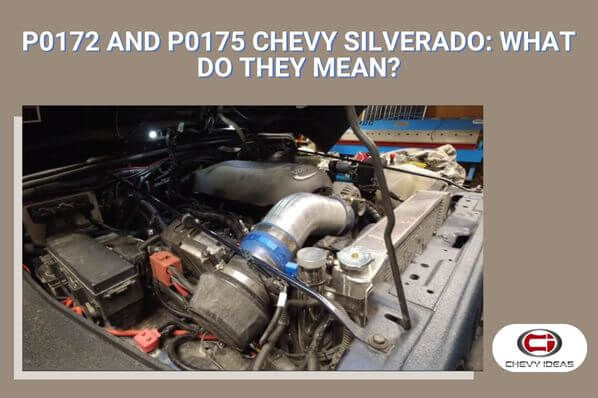If you’ve been having any problems with your Chevy Silverado and got it checked professionally, they’ve probably told you about some DTC codes you have. Different codes refer to different problems with your vehicle.
But what does it mean if you face a P0172 and P0175 Chevy Silverado? Both of these codes refer to rich fuel in the engine, P0172 referring to bank 1 of the engine having rich fuel while P0175 referring to bank 2 of the engine with rich fuel to the opposite side of the engine.
There’s much more to these codes than just that. So today, I’ll be going through these codes in detail, such as, what they are, what causes them, and what to do when they show up.

P0172 And P0175 Chevy Silverado Codes: Possible Reasons & Fixes
In short, P0172 refers to bank 1 having a rich fuel mixture to the engine. It’s the same for P0172 but for bank 2 instead. Both of these get triggered by the upstream oxygen sensor in your Chevy Silverado.
A rich fuel mixture basically means that there’s either too much fuel in the exhaust stream or too little oxygen. The sensors check the change in oxygen levels of the fuel by changing voltage signals. The fuel is rich if there are continual upwards changes in the voltage. If the voltage continually decreases, the fuel is lean, and your engine isn’t running properly.
Here’s a small table about the reasons you might have the codes P0172 and P0175, along with their solutions in short. This is only to get an idea about it, as I’ll go over them in detail later on.
| Reasons | Fix |
| Insufficient air getting inside the engine | Inspect the air filters to check if the air is flowing properly and if not, replace the filter. |
| Incredibly dry air filter | Check the PCV system or crankcase for dilution or fuel odor, and clean the filter or replace it |
| Improper engine cooling | Check the engine cooling systems and if needed, get it fixed |
| Improper fuel | Change the fuel |
How To Fix P0172 And P0175 On Chevy Silverado?
Unlike most other codes, P0172 and P0175 both are relatively easy to fix. Here are all the reasons you might get these codes and how to fix them —
Insufficient Air
As mentioned above, you might also have too rich fuel in your engine system if you have these codes. This can be caused by a lack of oxygen in the fuel, so the air filters play the biggest role in this case.
Solution
The solution for this is relatively easy. You simply need to find the air filter which is generally behind the glove box on most Chevy Silverado trucks. After that, inspect the air filter and check if any part is broken or dirty.
If anything is broken, I would highly recommend you to get the entire air filter changed completely. You can easily find air filters on a shop nearby, or you can simply order it from Amazon.
Dry Air Filter
If you have a dry air filter, air won’t be getting through the filter and your fuel won’t have enough oxygen in it. This can lead to terrible odor from the fuel or dilution.
Solution
To fix a dry air filter, you can first check for dilution or odor. You can do this by inspecting the PCV system under your Chevy Silverado’s hood and for the crankcase.
After verifying that you have this, you should clean the air filter immediately. Getting it professionally cleaned is the best option, but if the filter is already relatively old I recommend you to change it entirely.
Improper Cooling
If the fuel in your engine isn’t getting cooled down properly, the fuel can end up becoming more concentrated than necessary or too rich, causing the error codes. There is a dedicated engine fuel cooler, so this happens when the cooler malfunctions or is dirty.
Solution
To fix improper cooling and incredibly high or low temperatures, it’s recommended to get it checked by a professional. If it’s faulty, they’ll fix it, but if they charge too much, you should simply get another cooler and try a DIY installation. The item will usually cost around $150 or less on Amazon.
Improper fuel
When your fuel is too dilute or simply low quality and dirty, it can cause errors with the engine.
Solution
The solution to this problem is the simplest among all the others mentioned above, and you simply have to replace the fuel. You can easily find fuel from a car store nearby.
Frequently Asked Questions(FAQs)
Now that you have a good idea of the codes P0172 and P0175 on a Chevy Silverado, you can take a look at our most frequently asked questions. These can help to clear up any further confusion.
For the most part, your engine itself won’t matter as much, but the parts that help your engine function such as the air filters, PCV system, crankcase, cooling system, and the fuel itself matter more.
So differences in engines, such as 5.0 f150 vs 5.3 Silverado won’t matter much. You should focus more on your fuel filters, fuel coolers, and the fuel you’re using for the engine.
The code P0102 on a Chevy Silverado is very similar to the codes P0172 and P0175. You’ll get this code when there’s insufficient air in the air filter. So if you get this code along with the other two codes, you definitely have a problem with the air filter.
Chevy Silverado engines don’t use much oil, so you generally will save some money on oil. But on average, it will cost around $99 for a complete fuel change. This will generally last for a long time.
As these codes refer to problems with the fuel in your engine, I highly recommend you not to drive with them. If you drive with the codes on, you might not be able to accelerate properly or keep the engine running smoothly.
Conclusion
Hopefully, now you have a good idea about the codes P0172 and P0175 Chevy Silverado. This indicates to fuel is too rich in your engine. It can be caused by too little oxygen or having too much fuel in the exhaust stream.
If you run maintenance checks on the air filter, fuel cooling, and the fuel itself, you most likely won’t get this issue. Just make sure these parts are working fine. But if they’re working fine and you still get the issue, you should consider checking the MAF sensor, as it can be faulty as well.

